ESCP Business School facts for kids
|
École Supérieure de Commerce de Paris
Upper Business School of Paris |
|
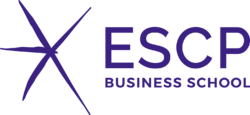 |
|
| Motto | It all starts here |
|---|---|
| Type | Grande école de commerce et de management (Private research university Business school) |
| Established | 1819 |
| Accreditation | AACSB & EQUIS |
|
Academic affiliations
|
Conférence des grandes écoles, Sorbonne Alliance |
| Budget | € 176 million (2023) |
| Chairman | Philippe Houzé |
| Dean | Leon Lalusa |
|
Academic staff
|
180 research professors: 100% PhD.; 38% female; 83% international |
| Students | 10,000 (undergraduate & postgraduate) 5,000 (executive education) |
| Location | |
| Colors | Blue and white |
ESCP Business School is a famous French business school. It is also known as École Supérieure de Commerce de Paris, which means "Upper Business School of Paris". It was started in Paris, France, but now has campuses all over Europe. You can find its campuses in Paris, Berlin, London, Madrid, Turin, and Warsaw.
ESCP Business School was founded in 1819. This makes it the oldest business school in the world! It offers many different study programs. These include programs for bachelor's degrees, master's degrees, and even PhDs. These programs help students learn about business, finance, and management.
ESCP is one of the top business schools in France. It is often mentioned with HEC Paris and ESSEC Business School. These three schools are sometimes called the "Parisiennes" because they are so well-known.
Contents
A Look at ESCP's History
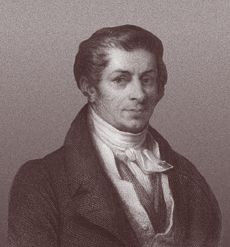
ESCP Business School was started in Paris on December 1, 1819. It was founded by two former soldiers, Germain Legret and Amédée Brodart. They wanted to create a school that taught people how to be entrepreneurs. An entrepreneur is someone who starts and runs their own business.
The school was inspired by the first "grande école" in France, called École Polytechnique. However, ESCP was not supported by the government at first. Even so, it quickly became known around the world. By the 1820s, it was already welcoming students from different countries.
Over the years, ESCP grew in importance. In 1898, it moved to its current main location in Paris. In 1869, the Paris Chamber of Commerce took over the school. They wanted to make sure future business leaders learned modern business methods. In 1892, ESCP started using very selective entrance exams. These exams are still used today to pick the best students.
Becoming a Multi-Campus School
A big change happened on April 5, 1973. This is when ESCP decided to become a multi-campus business school. This meant it would have campuses in different cities. The first new campuses opened in London (1974) and Düsseldorf, Germany (1975). The German campus later moved to Berlin in 1985.
Since then, ESCP has continued to grow across Europe. It became a truly European business school. In 2018, it became an "École consulaire." This means it gets a lot of its funding from public Chambers of Commerce in Paris, Berlin, and Turin.
- In 1988, a fourth campus opened in Madrid, Spain.
- In 1999, ESCP joined with another school called EAP.
- In 2004, a fifth campus was started in Turin, Italy.
- In 2005, the London campus moved to a new location.
- In 2015, ESCP opened its sixth European campus in Poland, with Kozminski University.
- In 2016, ESCP added a second campus in Paris. This new campus is in the Montparnasse area.
- In 2019, the school changed its name back to its original "ESCP Business School," removing "Europe" from the name.
What is a Grande École?
ESCP Business School is known as a grande école. In France, these are special higher education schools. They are separate from the main public university system. Grandes écoles are very selective. Students have to pass tough exams to get in. Many graduates from these schools go on to hold important jobs in France. Think of them like very top universities in other countries, such as Ivy League schools in the USA.
The degrees from ESCP are approved by the French Ministry of National Education. Higher education degrees in France have three main levels:
- The Licence, which is like a Bachelor's degree.
- The Master's, which is a Master's degree.
- The Doctorate, which is a PhD.
These studies are organized into semesters. Students earn "European credits" (ECTS) for each course. A Bachelor's degree needs 180 credits, and a Master's needs 120 more credits. The very popular Programme Grande École (PGE) leads to a Master in Management (MiM) degree.
How ESCP Ranks
Business schools are often ranked to show how good they are. These rankings look at things like how well students do after graduation and the quality of teaching. Here's how ESCP Business School has been ranked by the Financial Times, a well-known newspaper:
| Global Rankings Business Education - Financial Times | 2018 | 2019 | 2020 | 2021 | 2022 | 2023 | 2024 |
|---|---|---|---|---|---|---|---|
| European Business Schools | 11th | 14th | 8th | 14th | 3rd | 4th | |
| Master in Management | 5th | 5th | 6th | 7th | 5th | 4th | |
| Master in Finance | 2nd | - | 2nd | 2nd | 2nd | 1st | 1st |
| Executive MBA | 11th | 14th | 7th | 6th | 5th | 3rd | |
| Global MBA | - | - | - | - | 52nd | 27th | 25th |
| Executive Education Open | 37th | 51st | 41th | - | 19th | 17th | |
| Executive Education Customized | 18th | 18th | 14th | - | 12th | 14th |
ESCP Campuses
ESCP students can study at campuses in six different European cities: Paris (France), London (UK), Madrid (Spain), Berlin (Germany), Turin (Italy), and Warsaw (Poland). Students can choose to spend 6 months or a year at each campus. This allows them to experience different cultures and ways of doing business.
Each campus has its own special features. They also work with local universities to offer unique programs. For example, in Spain, ESCP has a Master in Business Project Management program with the Technical University of Madrid. In Italy, engineering students can get two degrees at once with the Polytechnic University of Turin.
Since 2017, ESCP has two campuses in Paris. One is near the Place de la République and the other is near the Montparnasse Tower. The campus near Place de la République is for graduate programs. The Montparnasse campus is for undergraduate students, executive education, and the school's "Blue Factory" which helps start-up businesses. In other cities, all programs are usually at one campus.
| Paris - Republique | Paris - Montparnasse |
|---|---|
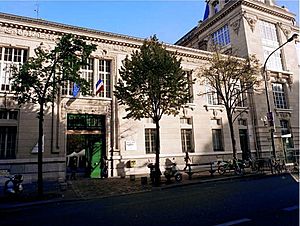 |
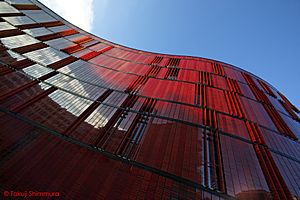 |
| Berlin | Turin | London |
|---|---|---|
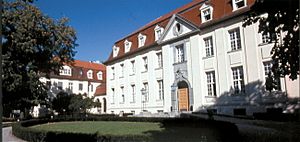 |
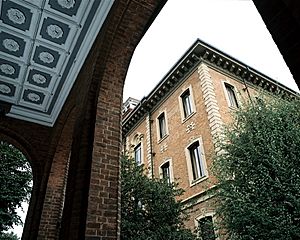 |
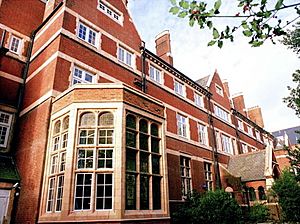 |
School Partnerships
ESCP works with over 100 other top schools and universities around the world. Many of these partnerships allow students to earn two degrees at once (dual degrees). This means students can study at ESCP and another university and get a degree from both!
Some of the universities ESCP partners with for student exchanges or dual degrees include:
- University of Vienna, Austria
- Copenhagen Business School, Denmark
- Aalto University School of Business, Finland
- WHU – Otto Beisheim School of Management, Germany
- Trinity College Dublin, Ireland
- London Business School, UK
- Imperial College London, UK
- Singapore Management University, Singapore
- New York University, USA
- HEC Montréal, Canada
- Tongji University, China
- Polytechnic University of Turin, Italy
- Waseda University, Japan
- Rotterdam School of Management, Erasmus University, Netherlands
- Kozminski University, Poland
- Korea University Business School, South Korea
- Cornell University, USA
- Massachusetts Institute of Technology, USA
Famous People Who Went to ESCP
Many successful people have studied at ESCP Business School. They have gone on to work in business, politics, research, media, and sports.
Business Leaders
- Christophe de Margerie (former CEO of TotalEnergies, a big energy company)
- Arnaud de Puyfontaine (CEO of Vivendi, a media group)
- Victor Herrero (CEO of Guess, a clothing brand)
- Pierre-Yves Roussel (CEO of Tory Burch LLC, a fashion company)
- Olaf Swantee (CEO of EE Limited, a mobile network)
- Alexandre Ricard (CEO of Pernod Ricard, a drinks company)
- Patricia Barbizet (former CEO of Christie's, a famous auction house)
- Patrick Thomas (former CEO of Hermès, a luxury brand)
- Antoine Riboud (Founder of Danone, a food company)
- Thierry de La Tour d'Artaise (CEO of Groupe SEB, a home appliance company)
- Patrice Louvet (CEO of Ralph Lauren, a fashion company)
- Cyrille Vigneron (CEO of Cartier, a jewelry company)
Politicians
- Jean-Pierre Raffarin (Prime Minister of France from 2002 to 2005)
- Michel Barnier (current Prime Minister of France)
- Roxana Maracineanu (former Minister of Youth Affairs and Sports in France)
Researchers and Educators
- Olivier Blanchard (former Chief Economist of the International Monetary Fund)
- Agnès Bénassy-Quéré (Deputy governor of Banque de France)
- Andreas Kaplan (President at Kühne Logistics University)
Media and Culture
- Leïla Slimani (Writer, won the Prix Goncourt, a top French book award)
- Christophe Barbier (French journalist)
- Irma (singer) (Singer)
Sports Stars
- Stéphane Diagana (Gold medalist in track and field)
- Érik Boisse (Gold medalist in fencing)
- Valérie Barlois (Gold medalist in fencing)
See also
 In Spanish: ESCP Business School para niños
In Spanish: ESCP Business School para niños
- Chamber of Commerce and Industry of Paris
- HEC Paris
- ESSEC Business School
 | Jackie Robinson |
 | Jack Johnson |
 | Althea Gibson |
 | Arthur Ashe |
 | Muhammad Ali |







